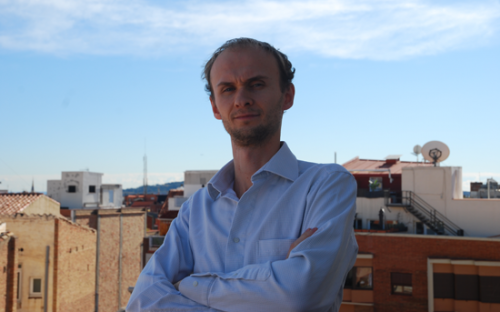Now MBA student at IESE Business School, diplomatic relations are no longer his burden to bear.
“The private sector might offer me very different opportunities and challenges,” he explained from IESE’s campus in Pedralbes, Barcelona. “That’s why I decided to get an MBA. But at the same time I want to leverage my previous experiences.”
Maksym has plenty of experiences to call upon. He worked at the Ukrainian Embassy in Tel Aviv, Israel, for around four years, before transitioning to the Ministry of Foreign Affairs and later becoming the Second Secretary in a diplomatic role in Vienna, Austria.
International exposure is an attractive quality to MBA employers. Does he think his background will give him a competitive advantage?
“I hope so,” he says. “I was attracted by the opportunity to work in international environments and to get to know different cultures. I think that helped me a lot to broaden my insight.”
Maksym may have had a seven-year career as a Ukrainian diplomat, but he is now hoping to negotiate business in the private sector. A year after studying International Relations in Russia, he was in Tel Aviv; quite the baptism of fire.
“My focus was on humanitarian issues, which were sometimes controversial,” he says. “We had different opinions. Ukraine and Israel share a complicated history.
“That history still influences the modern relations between countries and people, and in-turn it affects the business environment. I hoped we as an embassy could contribute to trade and the economies of Ukraine and Israel.”
Ukraine is going through a stage of political turmoil and a no-confidence vote calling for the resignation of Prime Minister Mykola Azarov was defeated in the Ukrainian Parliament on Tuesday. Maksym knows that, in business, it’s important to have a grasp of the political scene.
“It’s important to understand how the government is working; what is the driving force behind decisions taken?” he says. “I’m trying to leverage that.”
He had a fantastic experience working as a diplomat, but he realised he lacked some business skills and acumen. Queue the IESE MBA program – a consistent figure at the top of the global MBA Rankings.
“I realised that in order to work successfully in business, to breach the private and public sector, I need to understand the principles of both,” he says. “Having an MBA would be the perfect way for me to familiarize myself with at least the basics of business. It’s very important to me.”
Ukraine may not be as close to entering the European Union as some citizens might have hoped, but Maksym had no plans to study outside the region. IESE has campuses in Barcelona, Madrid, New York, Munich and Sao Paulo, among other cities; it was a perfect fit.
“I was also attracted by the two-year option,” he says. “I thought it would give me more time to digest all the new knowledge and skills that I would get, to learn them in a more profound way.
“So far it’s been very tough, demanding and challenging to cope with all the tasks and projects. But the more I contributed, the more results I got.”
The two-year MBA program at IESE gives students the chance to take a summer internship. Maksym worked for Knauf GmbH in Madrid for three months, a global company that distributes construction materials. It gave him a great insight into how companies have dealt with the financial crisis in Spain.
“It was very interesting and challenging at the same time,” he says. “In construction, the crisis hit especially hard. I saw that even in times of crisis, companies can survive, cover their fixed costs and keep all their staff. I thought having a summer internship would be important for my future career search.”
Approximately 97 per cent of IESE’s MBA students are employed within three months of graduation and Maksym thinks his degree will be of great use in securing a career.
His ideal MBA Job would be a mixture of public and private sector work. “Many companies have a government relations officer or a public affairs officer,” he says. “They basically have to defend the interests of the company to the government. I would be able to use my MBA skills and previous professional experience in that kind of role.”
He is also considering entering international development organizations. “They deal with governments a lot and provide support for them for infrastructure projects,” he continues. “I think it’s important for such organizations to produce those projects wisely, and invest in areas where you can see results. In that area, an MBA would be of great use.”
Maksym says he has been using the career services team at IESE and that they “work very hard to give students the opportunities that companies offer”.
Although he is making a career transition, he thinks there are many lessons that can be taken from a diplomatic background into business – especially negotiation.
“It’s very important to achieve a situation where all parties are interested in the final result,” he says. “I can use my experience working in Vienna, where I had to deal with over a hundred different countries, to reach a consensus.
“Knowing where and when to make a compromise, to what degree and knowing how much you have to defend your own position: I think this is really important in business.”
Handling the Ukrainian embassy in Tel Aviv would have been a challenge. But the private sector is a different beast.
With an IESE MBA, he will learn a lot more than compromise.
RECAPTHA :
ed
96
d9
39








